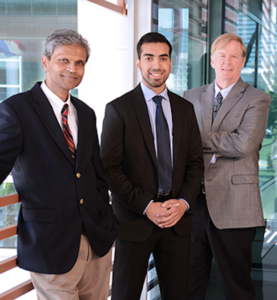Kady Watts, who just graduated from the Moore School, spent the spring semester of her senior year working with a team of students on a Capstone project with Siemens, the German engineering giant. The team was given data for the energy management division and asked to identify problem areas. Watts and her team came back to Siemens with red flags in 24 areas, ultimately homing in on three specific problems. They then tackled in detail problems ranging from how the supply chain and logistics route from Siemens’ Mexican factories to customers could be made more efficient, to how damage to products could be eliminated during the delivery route.

Global Supply Chain and Process Management professor Sanjay Ahire, left, 2015 Richter Scholar recipient Shahan Din, center, and Center for Global Supply Chain and Process Management Managing Director Jack Jensen. Moore photo
In between the rest of her coursework, Watts fit in conference calls several times a week with Siemens employees, and made eight three-hour drives back and forth to Siemens’ Raleigh, North Carolina office to meet with executives over the course of the spring semester.
‘A VERY UNCONVENTIONAL APPROACH TO BUSINESS EDUCATION’
“I remember staying up till 7 a.m. one morning on the phone with one of my peers and the faculty adviser,” says Watts, who will go to work for Ernst & Young this fall doing data analytics and computer forensics for the tax services giant’s litigation team. “We were just cranking out data over spring break. It was the biggest project of my entire life and really rewarding.”
Companies involved with the Capstone consulting project pay the Moore School a fee to be part of the school’s GSCOM. They then collaborate with the school on various class projects, in essence allowing students and their faculty project lead to act in a consultant role. Sanjay Ahire, a professor of operations and supply chain management at the Moore School, says the program takes a”very unconventional approach to business education” that stems from the marketplace.
“If you really look at it, in the for-profit world, this program could be seen as a super-successful startup where we have applied all elements of business, marketing, and supply chain strategies to make the program itself as successful as it is along all objective performance metrics,” says Ahire, the associate director of the school’s GSCOM, and the first tenured university professor to receive the Six Sigma Master Black Belt certification.
IMPRESSIVE WORK LANDS MOORE STUDENTS JOBS
Indeed, students bring a fresh perspective to supply chain problems that is insightful and impactful, and their advice can sometimes be more valuable than traditional industry consultants, says Benji Green, the senior director of Global Integrated Operations Planning for Avaya, a telecommunications equipment company that has done seven Capstone projects with the Moore School over the last four years. Over time, Green says, the teams that have worked with Avaya have put forth about $18 million in process improvement recommendations, about $5 million of which have been implemented.
The company has been so impressed with the Moore students that in the last two-and-a-half-years Avaya has hired eight supply chain majors from the school, Green says, all of whom have been through the Capstone experience, whether with Avaya or different companies.
“What’s great is that students are rolling their sleeves up and digging into the dirty problems that consultants just can’t address because they don’t have the time or the inclination, or don’t have the aptitude to dig into the nuances of a problem,” Green says. “It’s the nuances that make or break whether you actually solve a problem or not, so I’d say they are far superior to consultants in that regard. I think they meet a sweet spot that you can’t find in consulting at a reasonable price.”
A VALUABLE ‘UNBIASED SET OF EYES’
The Coca-Cola Bottling Co. is another corporate partner that has worked closely with the Moore School since 2011, and hired several Capstone students as full-time employees as a result. Moore students have put forth myriad helpful suggestions on how products should flow within the walls of the company’s warehouses, as well as ideas for design improvements in the company’s distribution centers, says Brett Frankenberg, Coca-Cola vice president of supply chain planning and inventory management.
Moore stuidents’ suggestions have saved the company $100,000 or more, Frankenburg says, as well as improved customer services and reduced lost sales of out-of-stock products.
“They look at problems differently than we may look at them ourselves, so they have an unbiased set of eyes,” he says. “They ask very different questions and have a fresh look at what can be ongoing or old problems. Their suggestions can cause us to re-evaluate our setup or take a different course of action.”
SEE ALSO PENN STATE NABS NO. 1 SUPPLY CHAIN RANKING or VILLANOVA TOPS FLAWED BUSINESSWEEK UNDERGRAD B-SCHOOL RANKING











Questions about this article? Email us or leave a comment below.